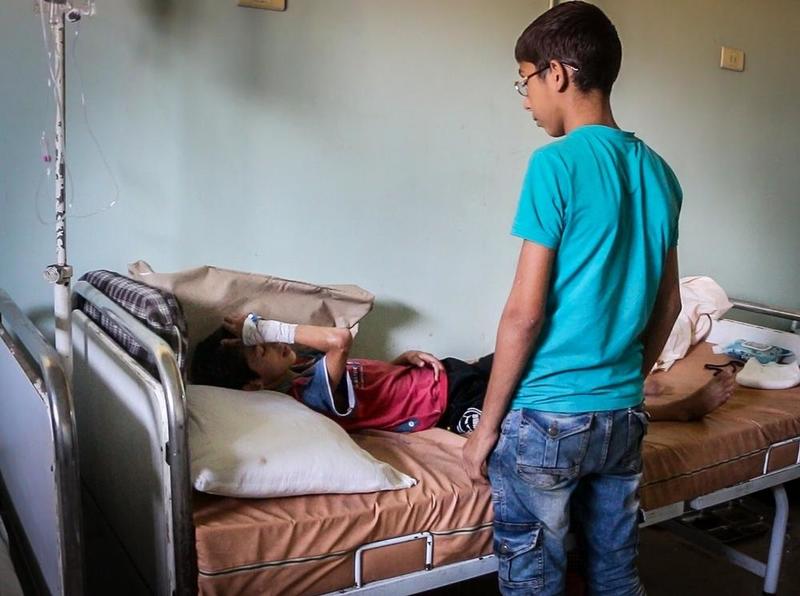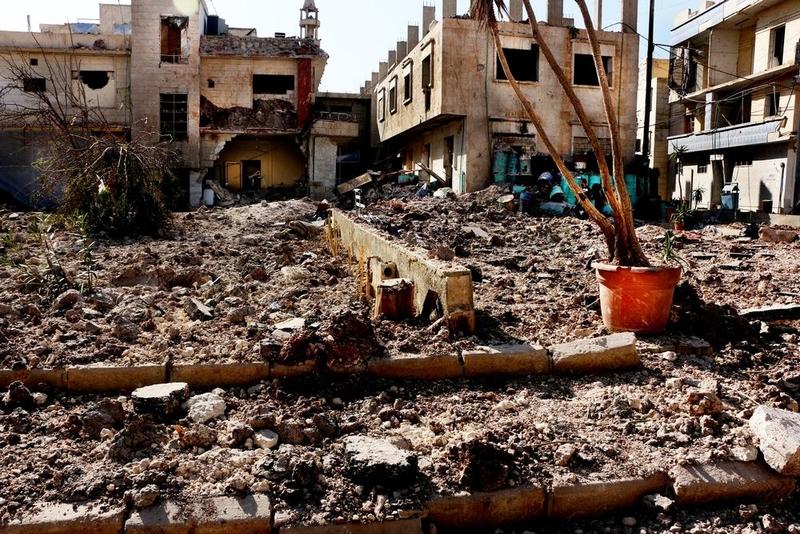Many of the people trapped in east Aleppo are under 18. The three-month-long siege, coupled with weeks of bombing and ground fighting, has had a devastating impact on their health
Children in east Aleppo face an increasingly critical situation – whether healthy or sick.
Food, drinking water and medical care are becoming even scarcer, while medical staff are struggling to cope with the large numbers of wounded.
At least 136 children have been killed, and at least 468 injured, by airstrikes since 22 September.
Desperately overcrowded and short of staff
The children are treated in hospitals that are desperately overcrowded and short of staff, medical supplies and intensive care beds.
“Our outpatient departments are overwhelmed,” says emergency room nurse Abu Al Motassem. “We are getting between 120 and 150 children every day.
“We received one child who needed to be admitted to the intensive care unit, but we were forced to keep him in the ward for some time, instead.
“He wasn’t able to make it and passed away.”
They wait for the warplanes to leave. The children are then in far worse condition
Of the seven hospitals currently functioning in east Aleppo, just one specialises in treating children. There are four paediatricians – two qualified doctors and two final-year medical students – in the besieged area, but no paediatric surgeon.
The shortage of medical staff has already had fatal consequences, according to Al Motassem.
“We had a child who required surgery for an oesophageal diverticulum, but we couldn’t find a doctor available in the whole of east Aleppo,” he said. “Any paediatric surgeon could have done it, it’s an easy operation.
“But there was no such surgeon, and the child died.”
Children denied access to specialised medical care
Some 1,500 child patients currently need specialised medical care that is unavailable in the besieged area of east Aleppo.
These include children with cancer, congenital abnormalities, brain damage, and those needing certain types of emergency care.
The situation is worsened by the fact that all roads out of the city are blocked, meaning staff cannot make referrals to external facilities.

Waiting for the warplanes to leave
Many parents fear travelling around east Aleppo while fighting is underway, choosing to wait at home with their sick children until the risk dies down.
“They wait for the warplanes to leave,” says Riyad Najjar, administrative manager of the only children’s hospital in the besieged area. “When they reach the hospital, the children are in a far worse condition.”
“Sometimes they are forced to wait all night long, and when they finally do arrive, the damage to the children is severe,” adds a neonatal nurse who wished to remain anonymous. “In some cases, it is too late to save them.”
Hospitals – dangerous places to be
Patients in east Aleppo’s hospitals stay for as short a time as possible, as they are notoriously dangerous places to be: 26 separate bomb attacks have been recorded during the ongoing siege.
There is pressure on medical staff to provide hospital beds. Because there is a shortage, patients spend less time in hospital than they may need. This can bring tragic consequences.
“Premature babies can need a long period in the intensive care unit before they are ready to leave, but as the time is not available, we are losing many of them,” says Najjar.
Additionally, staff are having to ration medicines because of a dwindling supply.
“Here in the neonatal ward and emergency rooms, many children die because there are no medicines available for them,” says Aya.
Meanwhile, children with less urgent medical problems are being neglected.
Given the hundreds of people wounded in airstrikes over recent weeks, general paediatric care is simply not a priority, according to medical staff in one of the hospitals supported by MSF.

Vaccinations and malnutrition
After many years of war, vaccination coverage among children is patchy and their immune systems are low, raising the risk of outbreaks of preventable diseases such as measles, meningitis and polio.
There are suspected cases of all three of these diseases in east Aleppo. However, they cannot be confirmed because samples can no longer be sent out of the city to a laboratory.
At the same time, there are shortages of many types of food, including meat, dairy products, fresh fruit and vegetables, and formula milk for babies.
“There is a serious lack of food for children, including formula milk,” says Al Motassem. “Some mothers aren’t able to breastfeed, while other children have lost their mothers.
“People can’t find formula milk, so babies are often given normal food at home, and this leads to acute malnutrition.
“The parents don’t know why this is happening.”
Malnourished children are more vulnerable to diseases, increasing their chances of illness.
With each day that goes by, life for children in east Aleppo gets increasingly more risky.
MSF in east Aleppo
We support eight hospitals in east Aleppo, only seven of which are currently functioning. We run six medical facilities across northern Syria and support more than 150 hospitals and health centres across the country, many of them in besieged areas.
Despite our best efforts, there are many areas – including west Aleppo – where we are currently unable to work, but we continue to push to provide humanitarian and medical aid in these areas.





